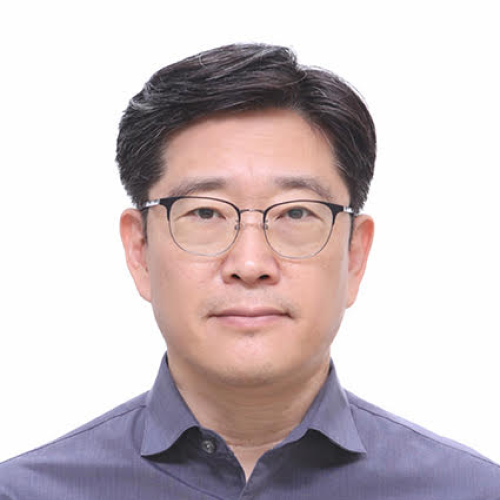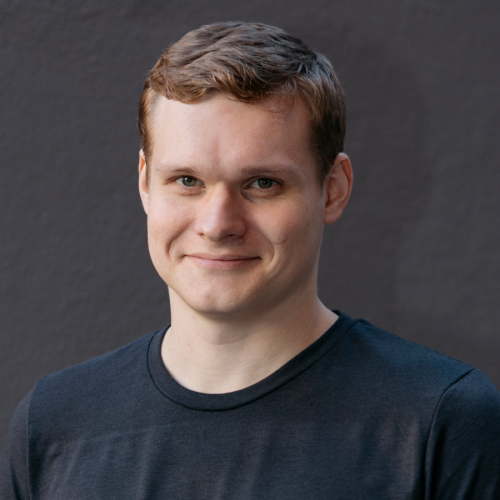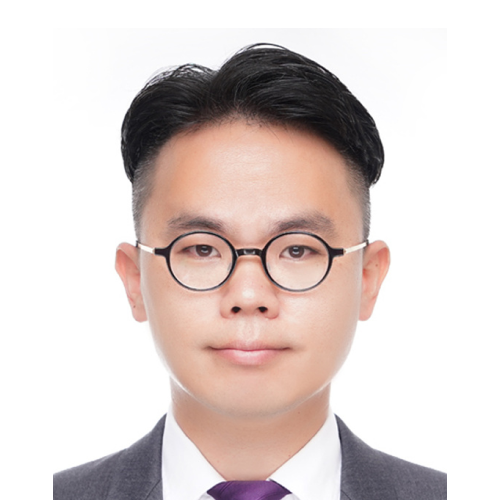



Speakers

서울시립대학교 교수 / University of Seoul, Professor
Keynote SessionModerator
Human-Centered Digital Innovation Powered by Big Data & AI

니어 프로토콜 공동창업자 / Near Protocol, Co-Founder
Keynote SessionSpeakers
The Convergence of LLMs and Blockchains
Illia Polosukhin is Co-Founder of NEAR Protocol, a decentralized developer platform powered by a sharded smart contract blockchain. NEAR’s vision of a scalable, robust, and highly usable blockchain began in 2018 when they couldn’t find a protocol that met the needs of builders. NEAR Protocol launched in 2020 and is focused on scaling to global mainstream adoption with the Blockchain Operating System. Before NEAR, Illia worked in AI research at Google and co-authored the landmark paper, “Attention Is All You Need.” Illia has appeared in the Wall Street Journal, CNBC, Bloomberg, TIME, Wired, New York Magazine, Forbes, and TechCrunch.
Keynote Session
일리야 폴로수킨
Illia Polosukhin
니어 프로토콜 공동창업자
NEAR Protocol, Co-Founder

네이버클라우드 대표이사 / NAVER Cloud Corp. CEO
Keynote SessionSpeakers
Corporations’ Strategies for Technical and Ethical Responses in the Era of Hyperscale AI
Generative AI technology is presenting new possibilities for improving productivity for businesses and individuals.
As this technology is no longer a choice but rather something essential, we would like to discuss the mindset and considerations of providers of generative AI services.
As AI technology advances, the importance of building, managing, and utilizing data has never been more important.
In this context, we want to touch upon issues surrounding data and the social and ethical responsibilities businesses should have.
Keynote Session
김유원
YUWON KIM
네이버클라우드 대표이사
NAVER Cloud Corp. CEO

펜실베니아대학교 교수 / University of Pennsylvania, Professor
Keynote SessionSpeakers
Navigating the Societal Landscape of Generative AI: Opportunities and Ethical Challenges
Weijie Su is an Associate Professor in the Wharton Statistics and Data Science Department and, by courtesy, in the Department of Computer and Information Science, at the University of Pennsylvania. He is a co-director of Penn Research in Machine Learning. Prior to joining Penn, he received his PhD from Stanford University under the supervision of Emmanuel Candes in 2016 and his bachelor’s degree from Peking University in 2011. His research interests span privacy-preserving data analysis, statistical learning, optimization, mechanism design, and high-dimensional statistics. He is a recipient of the Stanford Theodore Anderson Dissertation Award in 2016, an NSF CAREER Award in 2019, an Alfred Sloan Research Fellowship in 2020, the SIAM Early Career Prize in Data Science in 2022, the IMS Peter Gavin Hall Prize in 2022, and the ASA Noether Early Career Scholar Award in 2023.
Keynote Session
웨이지에 수
Weijie Su
펜실베니아대학교 교수
University of Pennsylvania, Professor

서울시 디지털명예시장 / Seoul Metropolitan Government, Digital Honor Mayor
Keynote SessionPanel
Keynote Session
이정훈
Jeong hoon Lee
서울시 디지털명예시장
Seoul Metropolitan Government, Digital Honor Mayor

SAS Korea 이사/ SAS Korea, Senior Consultant
Keynote SessionPanel
Keynote Session
고준형
JoonHyung Koh
SAS Korea 이사
SAS Korea, Senior Consultant

서울연구원 본부장 / The Seoul Institute, Director
Session1Morderator
Session1
변미리
Miree Byun
서울연구원 본부장
The Seoul Institute, Director

서울시립대학교 교수 / University of Seoul, Professor
Session1Speakers
전자정부의 역사와 행정혁신
Session1
김현성
Hyunsung Kim
서울시립대학교 교수
University of Seoul, Professor

서울디지털재단 책임연구원 / Seoul Digital Foundation, Principal Manager
Session1Speakers
Changes in Administrative Education of Public Officials’ Data according to the Appearance of GenAI
Since the introduction of ChatGPT 3.5 on November 30, 2022, the world has been captivated by generative AI. Prominent research institutions globally have started analyzing the impact of generative AI on fields such as medicine, education, design, law, arts, and employment. Private enterprises are striving to achieve economic benefits through generative AI, and governments are contemplating institutional measures to foster the generative AI industry and minimize its societal side effects. In essence, the entire world is keenly aware of the positive and negative impacts of generative AI. Among various sectors, the education field is adapting most agilely to generative AI. Educational institutions worldwide are swiftly conducting research on how to apply generative AI and are making efforts to successfully integrate it into their systems. Many universities, both domestically and internationally, are providing guidelines for utilizing generative AI like ChatGPT, and educational programs targeting professionals and the general public are proliferating. At the secondary education level, Seoul, in South Korea, have been preparing for generative AI education since March 2023, releasing materials such as ‘Seoul-style Artificial Intelligence Ethics Education’ and ‘AI Fundamentals for Teachers.’ Incheon, Busan, Gyeongsangbuk-do, and other regional authorities are also gearing up for generative AI education, starting as early as March or as late as May. In summary, education is focusing on learner-driven utilization and is evolving its methods towards utilizing AI and fostering collaboration. The core topic of this study, like other educational fields, concerns the direction in which administrative education will move in the era of generative AI.
To address this, the study aims to: Firstly, examine the socioeconomic changes brought about by generative AI, analyze trends in the education sector, and explore the developments in generative AI-related education. Secondly, assess the current status of data administration education and investigate how the demand for data administration education is changing through macroscopic trend analysis and comparisons. Thirdly, examine the case of data administration education at Seoul Digital Foundation, which is considered a successful example in the current era of generative AI, and analyze representative work application cases of learners. Lastly, propose the direction of data administration education.
Generative AI’s educational application is still in its early stages. Therefore, real-world cases are crucial at this juncture since there is limited accumulation of examples and theories. In this regard, the significance of the case studies in this research is substantial. However, limitations exist due to the relatively small proportion of case studies and the weak theoretical background of the convergence between generative AI and education, which hinder providing a profound direction.
Session1
이정환
Jeonghwan Lee
서울디지털재단 책임연구원
Seoul Digital Foundation, Principal Manager

서울연구원 부연구위원
Session1Speakers
Development of a sustainable and customized large language model in public domain
Session1
김준철
서울연구원 부연구위원

서울시립대학교 교수 / University of Seoul, Professor
Session1Speakers
Development of a sustainable and customized large language model in public domain
Session1
전종준
Jong-June Jeon
서울시립대학교 교수
University of Seoul, Professor

서울시 빅데이터담당관 / Digital Policy Bureau, Director
Session1Panel
Session1
윤충식
Chung Sik Yun
서울시 빅데이터담당관
Digital Policy Bureau, Director

서울연구원 선임연구위원 / The Seoul Institute, Senior Research Fellow)
Session1Panel
Session1
김상일
Sang-il Kim
서울연구원 선임연구위원
The Seoul Institute, Senior Research Fellow

서울시립대학교 교수 / University of Seoul, Professor
Session2Morderator
Session2
박재휘
Jaehui Park
서울시립대학교 교수
University of Seoul, Professor

케임브리지대학교 교수 / University of Cambridge, Professor
Session2Speakers
Beyond big data – what else is needed for smarter cities?
Dr Li Wan, Associate Professor in urban planning and development at the Department of Land Economy, University of Cambridge. He is the Director for the MPhil in Planning, Growth and Regeneration (PGR) programme, and Fellow of Gonville and Caius College. Dr Wan is interested in interdisciplinary modelling of urban land use and transport systems. His recent research interests include strategic planning at the city/regional level, impact study of flexible working, micromobility and electric vehicles, and transport decarbonisation. Dr Li Wan is a co-investigator of the Centre for Smart Infrastructure and Construction and a Trustee of the IJURR Foundation. His new book: Digital Twins for Smart Cities (2023).
Session2
리완
Wan Li
케임브리지대학교 교수
University of Cambridge, Professor

SDAIA
Session2Speakers
Session2
Saeed Alshahrani
SDAIA

서울연구원 선임연구위원 / The Seoul Institute, Senior Research Fellow
Session2Speakers
Session2
김상일
Sang-il Kim
서울연구원 선임연구위원
The Seoul Institute, Senior Research Fellow

서울특별시 통계데이터전문관 / Seoul Metropolitan Government
Session2Speakers
Session2
원유복
Yu-Bok WON
서울특별시 통계데이터전문관
Seoul Metropolitan Government

한국교통연구원 부연구위원 / Korea Transport Institute, Associate Research Fellow
Session2Panel
Session2
조정우
Jungwoo CHO
한국교통연구원 부연구위원
Korea Transport Institute, Associate Research Fellow

서울연구원, 본부장 / The Seoul Institute, Research fellow
Session3Morderator
Session3
최준영
Junyoung CHOI
서울연구원, 본부장
The Seoul Institute, Research fellow

서울시 데이터분석가 / Seoul Metropolitan Government
Session3Speakers
Session3
이원재
Won-Jae Lee
서울시 데이터분석가
Seoul Metropolitan Government

한국보건사회연구원 정보통계연구센터장 / Korea Institute for Health and Social Affairs
Session3Speakers
Session3
오미애
Miae Oh
한국보건사회연구원 정보통계연구센터장
Korea Institute for Health and Social Affairs

통계개발원 통계방법연구실 주무관 / Statistics Research Institute Data Science Team, Assistant Deputy Director
Session3Speakers
Statistical Pioneering : AI-Driven Statistical Classification
Statistical classification takes up a lot of time and manpower at Statistics Korea. And it is so important that it is used in more than 31 types of statistical surveys.
For this important task, Statistics Korea’s Statistics Research Institute has introduced machine learning technology to improve statistical classification work faster and more efficiently.
As part of the Digital Public Service Innovation Project organized by the Ministry of Science and ICT in 2022, the system was developed with the National Information society Agency (NIA) and is currently used by Statistics Korea for statistical classification.
Session3
유찬균
Chankyun Woo
통계개발원 통계방법연구실 주무관
Statistics Research Institute Data Science Team, Assistant Deputy Director

UNU센터 연구원 / UNU-EGOV, Research Specialist
Session3Speakers
Global assessment for responsible AI in cities
Soumaya Ben Dhaou is Research Specialist at the United Nations University Operating Unit on Policy-driven Electronic Government (UNU-EGOV), a think-tank devoted to multidisciplinary research on how digital transformation may contribute to empowered democratic citizenship, trustworthy public infrastructures, more inclusive societies and, in broad terms, to sustainable development. She is coordinating the research line on “Digital transformation, Innovation and Emerging Technologies”, investigating the potentials of emerging technologies such as Blockchain, Artificial Intelligence, IoT and Data Analytics and their impact on transforming urban centres and settlements, Government and public service. She is investigating with her team “the leapfrogging strategies with emerging technologies in Africa” and exploring the implications of the most recent technologies such as Metaverse and ChatGPT on Government and Public Service. She is committed to advancing smart cities and digital governance for sustainable development. With a strong focus on innovation and emerging technologies, her work encompasses various dimensions of urban transformation.
Currently, she is collaborating with UN-HABITAT on a global survey assessing the responsible use of AI in cities. This project exemplifies her dedication to exploring cutting-edge technologies for urban development. Soumaya is lead contact for UNU-EGOV collaboration with the International Telecommunications Union (ITU) where she was responsible for a number of working groups under the U4SSC (United 4 Smart Sustainable Cities Communities) and led the Blockchain for cities project and co-lead “simple way to be smart” focusing on smart cities and digital governance, emphasizing the need for efficient, inclusive, and sustainable urban development.
Session3
소우야마 벤 다우
Soumaya Intissar BEN DHAOU
UNU센터 연구원
UNU-EGOV, Research Specialist

한신대학교 교수 / Han Shin university, Assistant Professor
Session3Panel
Session3
노승철
Seung Chul Noh
한신대학교 교수
Han Shin university, Assistant Professor

서울디지털재단 책임연구원 / Seoul Digital Foundation, Principal Researcher
Session2Panel
Session2
박지혜
Ji-Hye Park
서울디지털재단 책임연구원
Seoul Digital Foundation, Principal Researcher

서울디지털재단 경영전략실장 / Seoul Digital Foundation , General Manager
Session4Morderator
Session4
주성환
Sung-Hwan Ju
서울디지털재단 경영전략실장
Seoul Digital Foundation , General Manager

서울시립대학교 교수 / University of Seoul, Professor
Session4Speakers
The Ethics of AI and Big Data for Sustainable Development and Prosperity
In this presentation, I will argue that an ethics of AI and big data is needed in the AI and big data era to ensure that AI and big data can be used sustainably for prosperity and development. This is because if we fail to effectively address the ethical issues raised by AI and big data technologies, and if we lose the trust of citizens as data providers, we will not be able to obtain the continuous supply of high quality data that is necessary for the sustainable use of AI. The ethics of AI and big data needs to be systematically established through a proper relationship between the three tiers of theory, institutions, and individuals for “ethics realization,” effectively engaging and cooperating through a division of labor. At present, the ethics of the individual tier, which is necessary for the realization of ethical values, has received relatively less attention and needs to be strengthened. To this end, I propose a virtue-based AI ethics model for AI professionals and citizens, which effectively contributes to motivating their normativity in the first-person perspective.
Session4
목광수
Kwangsu Mok
서울시립대학교 교수
University of Seoul, Professor

서울시립대학교 교수 / University of Seoul, Assistant Professor
Session4Speakers
Reconsidering AI application in the legal domain
Recent advancements in deep learning for AI have shown remarkable performance across numerous NLP tasks in legal domain. In particular, GPT-4’s achievement of passing the bar exam has garnered widespread attention. However, it is less well-known that GPT-4 underperforms in the Chinese lawyer qualification tests. Additionally, GPT-4 still demonstrates imperfect performance in many legal AI tasks. In this talk, we will first introduce various applications of AI in the legal domain, using exemplary tasks from Korean precedents. Then, we will examine the potential problems that may arise from the bold application of AI. Finally, we will discuss where AI can be more convincingly applied based on the IRAC legal reasoning framework.
Session4
황원석
Wonseok Hwang
서울시립대학교 교수
University of Seoul, Assistant Professor

서울디지털재단 선임연구원 / Seoul Digital Foundation, Senior Researcher
Session4Speakers
The Service Development Case using Large Language Model in Generative AI
This study aims to describe the LLAMA-SDF model developed by the Seoul Digital Foundation and its application in chatbot service development.
Developing a model suitable for public services requires building an open-source, cost-effective, internally serviceable model with low risk of data leakage for security.
For this reason, the Seoul Digital Foundation selected LLAMA2-ko-chat, a Korean model based on Meta’s LAMA2, as a pre-trained model for the development of the LLAMA-SDF model.
To reduce hallucination phenomena, data construction involved the conversion of 106 videos of elderly digital education content, owned by the foundation, into text as foundational data. To supplement the insufficient data, data augmentation was performed using GPT-3.5 turbo, and fine tuning was performed using the T5 model.
To improve model performance, we used techniques such as Fine-tuning(SFT, RLHF), Prompt learning and applied LoRA Adapter to utilize GPU memory efficiently.
The developed LAMA-SDF model was applied to digital counseling chatbot for the elderly with the aim of providing a question-and-answer environment for the elderly’s digital queries.
This study has important significance in contributing to the realization of smart public administration and the development of citizen-centered services by laying the groundwork for the development of a generative artificial intelligence language model.
Session4
손고은
Goeun Son
서울디지털재단 선임연구원
Seoul Digital Foundation, Senior Researcher

서울연구원 부연구위원 / The Seoul Institute, Associate Research Fellow
Session4Speakers
Technological Approaches for Non-contact Smart Civil Petition Service
Despite the high demand for non-face-to-face civil complaints, there are still cases where direct visits or mail applications are required, so a technical application strategy is needed to switch to a simplified application method that does not require visits.
In this study, we developed a three-step plan to convert civil service that requires direct visits or mail applications to contactless.
(Step 1) Analyze the status of civil service, identify implications, and review the applicable laws and regulations.
(Step 2) Review and improve the civil service process based on the implications derived from step 1.
(Step 3) Research and development of application plan for technology necessary for improving civil service.
In addition, we proposed an intelligent online civil complaint application service that can easily create and use an online civil complaint channel. The service supports an automation function that makes it easier for civil petitioners to apply online, and allows civil petitioners to create and process online application channels.
Session4
김혜진
Hyejin Kim
서울연구원 부연구위원
The Seoul Institute, Associate Research Fellow

서울시립대학교 교수 / University of Seoul, Professor
Session4Panel
Session4
강민규
Kang Mingyu
서울시립대학교 교수
University of Seoul, Professor

이화여자대학교 법학전문대학원 교수 / Law School, Ewha Womans University, Professor
Session4Panel

